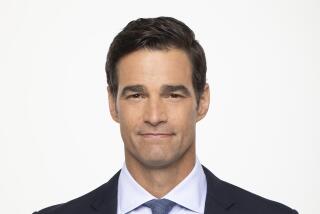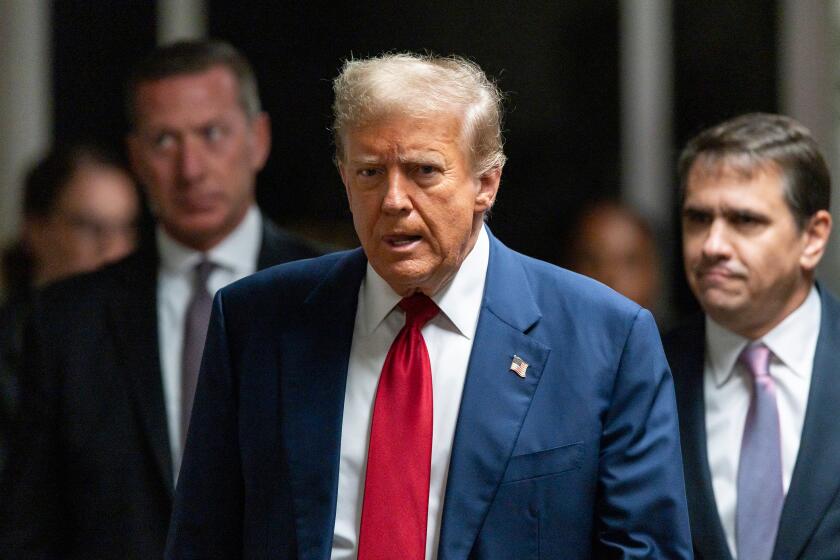Plan Would Split Media Giant Into 4
Intensifying his battle for Time Warner Inc., financier Carl Icahn detailed a plan Tuesday that he argued could lift the media giant’s stock price as much as 43% by breaking it into four pieces.
Icahn continued his personal attack on Time Warner Chief Executive Richard Parsons, whom he has blamed for the company’s stock slump.
But the billionaire investor signaled for the first time a willingness to retain Time Warner President Jeffrey Bewkes, Parsons’ heir apparent, if he prevails.
Under the 348-page plan devised by Icahn’s investment bank, Lazard Ltd., Time Warner would spin off its AOL, cable and publishing divisions into three publicly traded companies. It would retain the Warner Bros. movie studios and cable networks such as HBO and CNN.
At a crowded New York news conference, Icahn accused Parsons of being “in love with the conglomerate structure” of Time Warner.
He added that Parsons was more interested in talking about the view from his office at the posh new corporate headquarters at Columbus Circle in New York than about the America Online unit, which has been a drag on Time Warner’s stock since their ill-fated marriage five years ago.
“The time has come to lift the Columbus Circle cloud and let the sun shine on our great assets,” said the 69-year-old activist shareholder.
Parsons has contended that Time Warner runs more efficiently under one roof than it would if broken into smaller pieces. He has said that turning around America Online would do more to boost the stock than any breakup demanded by Icahn.
In response to Icahn’s presentation, Time Warner said in a statement, “We are on the right path. The company is delivering.”
Although Icahn has previously called for Time Warner to spin off its cable group and buy back more of its stock, he went a step further Tuesday by endorsing Lazard’s more radical overhaul proposal.
Frank Biondi, the former Viacom Inc. chief executive Icahn recruited last week to replace Parsons, predicted that it would take him nine to 18 months to split up the company.
Biondi also singled out Bewkes for the job of running a new Time Warner.
“I hope Bewkes will stay. He’s a terrific piece of manpower,” Biondi said. Biondi supervised Bewkes as head of Time Warner’s Home Box Office in the early 1980s.
Biondi will receive $6 million for joining Icahn even if the financier loses, and at least $10 million if he replaces Parsons.
When asked whether Biondi’s assessment of top management contradicted his own, Icahn first referred to his recruit as “Ken” before correcting himself. He then conceded that he didn’t know Bewkes but had heard good things about him.
Lazard concluded that mistakes and short-term management thinking at Time Warner had cost shareholders $45 billion in value over the last three years.
“There’s no compelling reason today for these businesses to remain together,” Lazard CEO Bruce Wasserstein said. Wasserstein was the architect of the January breakup of Viacom Inc. into two companies.
Wasserstein faulted Time Warner’s management of AOL in particular.
“Since 2002, almost every strategic decision concerning AOL has been wrong,” he said.
He said AOL did not take advantage of its leading position in instant messaging to bring in advertising and to venture into Internet-based telephone service. He also said Time Warner failed to used its position as a major cable company to shift AOL subscribers to high-speed Internet access from slower dial-up service.
Under Parsons, Wasserstein said, corporate overhead rose 47%, to $450 million. He faulted the company for failing to identify bloated overhead, citing as an example $250 million in cost reductions that were found at Warner Music Group by its new owners.
Lazard also faulted Time Warner for missed acquisition opportunities, suggesting that the company should have been more aggressive in pursuing Metro-Goldwyn-Mayer, which was purchased by an investor group led by Sony Corp., as well as AT&T; Broadband, whose acquisition catapulted Comcast Corp. to the cable industry’s top ranks.
Some analysts said some of the criticisms were unfair.
Since Parsons took control, he has been cleaning up the mess left by the failed AOL-Time Warner merger, including settling an investigation by the Securities and Exchange Commission.
“Parsons couldn’t make acquisitions when Time Warner was under investigation,” said veteran analyst Harold Vogel of Vogel Capital. “Icahn makes some solid points. Some of the criticism is valid. But you’ve got to be a little cynical.”
Some analysts were surprised by Biondi’s overture to Bewkes, viewing it as part of a divide-and-conquer strategy. Should Bewkes, 53, ally with the Icahn camp, he could rise to the top of Time Warner without having to wait for Parsons, 57, to retire.
Bewkes was dismissive. “Dick and I are a team, and any speculation to the contrary isn’t worthy of comment,” he said in a statement.
So far, Icahn’s plan has not been widely embraced by investors. He and his allies control slightly more than 3% of Time Warner’s stock.
Still, some analysts said Icahn could gain some traction because of Lazard’s analysis.
“Parts of the Lazard report are fascinating and have merit,” said Richard Greenfield, an analyst at Pali Capital Inc. “The swing factor is how Time Warner reacts.”
Greenfield said he agreed with Lazard that cable should be spun off, but he was not sure it made sense to separate the movie and TV studio from AOL at a time when entertainment and the Internet are converging.
Icahn’s next step is likely to be unveiling in the next two weeks a proposed slate of directors at the company’s shareholders’ meeting in May. Time Warner shares have gained 5.8% since the company reported a 21% increase in fourth-quarter profit last week.
But Time Warner stock has declined 8.5% since Parsons took charge and has underperformed media companies and the market as a whole, according to the Lazard report.
Shares dropped 21 cents Tuesday to $18.36. Lazard’s report was released after the markets closed.
*
Times staff writer Walter Hamilton in New York contributed to this report.
More to Read
The biggest entertainment stories
Get our big stories about Hollywood, film, television, music, arts, culture and more right in your inbox as soon as they publish.
You may occasionally receive promotional content from the Los Angeles Times.






